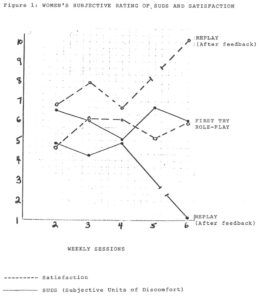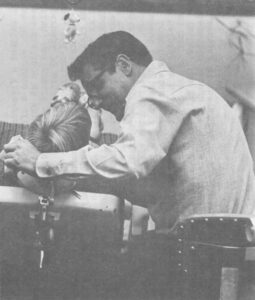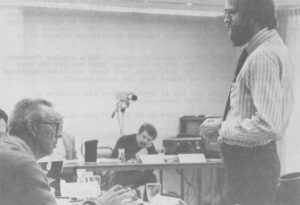Chicago — “What happens if tomatoes do have feelings?” a young woman was heard to ask as she and her companion left the Conrad Hilton Hotel. The question was inevitable; just as setting a thousand monkeys to work at typewriters would eventually produce Shakespeare, setting several thousand psychologists together in the Loop was bound to produce silliness.
The national convention of the American Psychological Association was in its third day. Over at the Palmer House commercial exhibitors were hawking a fabulous assortment of technology, from biofeedback systems to M&M dispensers (yours for only $148 from Lafayette Instrument Co.), from hideous experimental chambers for monkeys to the latest personal vibrator for your wife (or yourself, and while you’re at it pick up a jar of Special Moment “Massage Cream for the Two of Us”).
There was no getting past the exhibit of the Multi-Media Resource Center of San Francisco. Glassy-eyed professionals blocked the aisles to watch a middle-aged couple make joyful, noisy love in the center’s newest sex therapy film. Right next door the center was showing “The Male Sex Cycle,” and over the sighs and giggles from the other film you could hear the commentator calmly describing the way to a man’s heart: “She is using saliva, which is an excellent lubricant…. Her stimulation is very lusty…. Note that intense squeezing does not cause pain.”
It was not an event to grasp easily like, say, a Tupperware sales meeting. The APA has many mansions — from humanistic psychology to Army psychology, from guidance counseling to neuroscience; a total of 35 divisions. The convention program was a paperbound book 254 pages long, and everywhere conventioneers thumbed through it like a Sears catalog. There were presentations ranging from “An Experimental Approach to Shoplifting Prevention” to “The Impact of Comedy Writers on Society,” “The Mental Health Contribution to Disaster Relief,” and “The Case for Lesbians as Role Models for Healthy Adult Women.” Perhaps as a bit of nose-thumbing in Sen. William Proxmire’s direction, there was an entire symposium on “Interpersonal Attraction,” including at least one paper on “Physical Attractiveness in Dating Couples.” One looked for some sign of the times in the midst of all this; some event of a larger order.
Three ballrooms had been broken open to make one mammoth hall for B.F. Skinner’s address. It was perhaps the most glamorous room available in the city. The Hyatt Regency, sited on Wacker Drive in the heart of the Loop overlooking the Chicago River, is an opulent place, perhaps too opulent for his tastes but certainly grandiose enough for his ideas. Well-dressed, fairly hip young professionals massed with older, seedier professorial types to fill every seat and inch of aisle space in the giant hall as the American Psychological Association prepared to greet the thin, grandfatherly, bespectacled professor from Harvard.
There were rumors that Skinner was not in good health and had been badly demoralized by the ferocious criticism that assailed his recent book, Beyond Freedom and Dignity, in which he made a plea for the abandonment of “autonomous man” and proposed solving the world’s problems through “behavioral engineering” of the social and physical environment.
If Skinner was in ill health he did not show it; and for a demoralized man he was surprisingly unabashed about proposing the very same solution here. His topic was “Walden II Revisited.” After describing the literary history of his 1949 utopian novel (how it was mostly unnoticed for 12 years after which “sales rose on a compound interest curve in a most reinforcing way”), he proceeded to speculate about why the novel still draws interest.
“A technology of behavior is no longer a figment of the imagination” and the kind of social organization which is based on that technology in Walden II looks more and more like what we need to cope with the immense problems that have emerged since the Second World War,” he said.
There are technological solutions to the depletion of resources, environmental pollution, overpopulation, crime, and nuclear war, he said, but “all of these technological solutions depend on human behavior”; people must be induced, somehow, to use the tools at hand. Skinner thus presented his own technology as the sine qua non, the ultimate technology, the final link which would tie humanity to its own salvation. “I am talking about the lives of billions of people,” he said.
Take, for example, the shortage of gasoline. The obvious solution to ward off depletion is to raise its price, Skinner said. This would, however, force many people to stay at home. They would feel themselves being punished. One by-product of punishment is aggression, and these stay-at-homes could be expected to become aggressive and strike out at those who they perceived were responsible. (Politicians already know this, he said, which is why gas price hikes are so hotly contested). A few million angry stay-at-homes could be persuaded to support hostilities against the Arab states; vandalism and hostility toward business would increase; and resentment might even be directed against people wealthy enough to continue driving.
“A better solution,” he said, “is to make home a more interesting place. Come to Walden II for an example.”
To the criticism that Walden II is a small community model and wouldn’t work in New York, Skinner said: “What is so wonderful about size? It is better to ask whether we need big cities. People who flock to the cities for better jobs and more interesting lives would flock back if better jobs and more interesting lives were there…. With modern communications, the future may be a network of small towns; why not Walden IIs?” He then went on to specify how Walden II communities could “solve most of the problems facing human beings today”:
Consumption. “We needn’t speak of frugality in terms of sacrifice. There are people in the world happier than we are while possessing less.” In a Walden II community people would be induced to want a fair share of goods and no more.
Pollution. “A small community is best for recycling,” and lower consumption would reduce waste.
Unemployment. In Walden II “there are many ways of saving labor but not to save laborers.” Work and wages would be evenly divided.
Overpopulation. People would be induced to have small families and “everyone would perform parental roles.”
Crime. In big cities the commendation or censure of people you will never see again is meaningless. “We know how to arrange the face-to-face conditions which promote respect and love.” Besides, “people are likely to treat each other with respect if they are not in competition.”
Delinquency. “You and I know how early environments can be improved. But we leave them now to people who give everything from child abuse to over-protectiveness and who lavish emotions on wrong behaviors.”
Education. “You and I know how to teach children self-management….Small communities would be ideal settings, free from politicians, parents, and organizations of teachers.”
The Development of Talent. “We who understand contingencies of reinforcement know how people can be led to those things they do best.”
Leisure. People now spend their time on “drugs, gambling, and watching other people lead exciting and dangerous lives…. You can spend your life at this and be unchanged at the end.” Walden II would cultivate growthful use of leisure.
Health. “Those of us who know the joy of reinforcement know how it bears on health.”
Politics and Economics. “I’m not sure we must answer these questions…. Something is wrong when the system must be saved at the expense of the way of life which the system is supposed to serve.”
Welfare. “The community is welfare.”
Defense. “We have it only because others do and in the long run it is a total waste. The real threat is the countries which have next to nothing. A way of life in which each of us used only his fair share of the world’s resources would be a real contribution to world peace.”
The State. In Walden II “formal controls based on legal controls may not be necessary.”
“All right,” Skinner conceded magnanimously, “I’m being overly optimistic and a little reckless.” It was obviously a gesture. He meant every word, and he went on to consider how his behavioral revolution could be launched.
Through democratic process? “We lose faith in democratic method when the democratic will is so obviously controlled and manipulated,” he said. Through revolution? “While the People’s Republic of China is closer to solutions than we, a Communist revolution in America is hard to imagine.”
No, he said, the best strategy is to avoid political action altogether and instead perpetrate a cultural subversion from the ground up. “The great cultural revolutions have not started with politics,” he said, adding that great men like Confucius, Buddha, Christ, and Marx “were not political leaders.”
The behavioral Red Guard at the Hyatt gave their Chairman a rousing ovation.
Back on Michigan Avenue, in the French Room of the Sheraton Blackstone, another symposium was taking place. Its title was provocative: “Unemployment — America’s Major Mental Health Problem.” In an oblique way it was the complement to what Skinner had said, for it showed that in the absence of any psychologist, people’s behavior is still systematically modified, and often in hideous ways, by changes in the economic environment.
The most chilling statistical description of these behavior changes came from Dr. M. Harvey Brenner, a professor at Johns Hopkins University. Brenner correlated data on unemployment trends and social ills during the last 100 years in the United States and in New York City.
Brenner said that it has been known since the 1950’s that as one moves down the social ladder one finds more of every kind of pathology and deviancy — crime, illness, alcoholism, mental instability. The controversy has been, he said, whether this is because poorer people are under more stress from the environment or whether the individuals at the bottom find their way there because they are “predisposed to lead disordered lives.”
His computations confirm the environmental theory. “In the United States and in New York City over the last 100 years there are no trends in mental health not associated with fluctuations in the national economy,” he said. Suicide rates are so closely tied that “they are virtually economic indicators,” he said. Men tend to be more sensitive to hard times than women: more men succeed in killing themselves in periods of high unemployment; more women try but fail. In mental hospital admissions, middle class and upper class economic groups are the first to crack during recessions and depressions — but especially during recessions.
The picture on crime and violence is much the same, Brenner reported. Child abuse leading to the death of the child, especially at the hands of the mother, is highly correlated with unemployment rates, as are robbery and rape. Violent crimes against persons increase during periods of unemployment and also during periods of economic growth which exclude minorities from the prosperity. (Homicide and manslaughter are more linked with structural unemployment where one’s social group is forever getting the short end of the stick). Most offenders between the ages of 25 and 29 and between 40 and 50 commit their acts against someone in their own family. In imprisonment rates from 1900 to the present, “few other trends make the difference that employment does,” he said.
The effect of unemployment on general health is more delayed, Brenner said, because heart disease, kidney disease, and strokes take time to show up after the period of stress. “We won’t see the heart disease effects of the present recession for two to five years,” he said. The lag for men over 30 is three to five years; for men under 30, one to two years. Women under 45 seem immune, he said, but from 45 to 75 they are extra-sensitive to employment dips leading to heart ailments. Strokes take their toll seven years after the economic downturn, he said. Auto accidents and deaths from cirrhosis of the liver are linked both to unemployment and to affluence. “People apparently turn to drink when things are very bad or very good,” he said.
Ominously, since World War Two the correlations between all of these miseries and unemployment have grown more sensitive. “It took a 30 per cent drop in employment to send people to the mental hospital in the past,” Brenner said. “A five to 10 per cent drop does it today.” The present recession, he concluded, “is going to have a greater absolute effect on infant mortality, cirrhosis, heart disease, and all the rest, than the Great Depression did.”
A more textured portrayal of the psychic damage wrought by unemployment was made by Dr. Hannah Levin, a professor at Richmond College of the City University of New York, who reported the results of her interviews with a large number of jobless New Yorkers at unemployment offices in Brooklyn and Staten Island.
Work, she said, has been grossly underestimated as a source of human development. “A job is a source of constant contact with reality, a source of feedback, of sex role cues, of associations,” she said. “Work structures time. It makes the world predictable.” She said the men and women she interviewed, when asked what the worst thing was about being out of work, aside from loss of income, most commonly replied: “Time drags.” Boredom sets in and people stop making plans. “The lack of future orientation so often ascribed to lower income groups comes not from the person but from the environment,” she said, noting that her interview subjects included many professionals.
One person told Dr. Levin that he felt he was “getting into a rut, depressed, not feeling legitimate any more.” Another said he felt “ashamed on dates. I feel cheap.” “Work confirms a person’s adult status,” she said. Being out of work makes a person feel dependent, like a child. It also makes men feel impotent. Many men reported sexual dysfunction; they felt castrated. Both men and women reported a sense of helplessness and their dreams were full of scenes in which they were out of control.
The behavior change that overcame some men was dramatic, Levin said. “They got ‘sick’ or had ‘nervous breakdowns.’ Being a patient, assuming the sick role, was better than being out of work.” Other people went to college to maintain some status and avoid the stigma of joblessness. Some told her of stealing or trying suicide.
Most depressing of all, Levin said, was that 90 per cent of those interviewed felt personally to blame for their situation. (If only they hadn’t screwed around in school so much, etc.) “They are not only victimized by national economic policy, they are also victimized by the ideology that you’re to blame if you’re not working.” “They are filled with feelings of shame and loss,” she said.
Her conclusions: First, “full employment must be the goal of any mental health program.” Second, “lack of work for 18-year-olds, 20 to 40 per cent of whom are now unemployed, may be far more damaging developmentally than for adults, and may cause more crime. Development does not stop,” she said, “it becomes twisted.”
Utopia and recession: the juxtaposition is unsettling. Skinner’s analysis seems vindicated in many ways. For where is “autonomous man” in the ranks of the unemployed? When people are removed from the reinforcing environment of work they fall apart. They feel “out of control” — but whose control? They lose their sense of worth — but what confers that worth? And is not the ideology of freedom and dignity the most pernicious feature of their disability? They are not free and do not feel dignified, and they hold themselves to blame because all freedom and dignity is said to reside in them. If there is a flaw, it must be theirs. Yet it is the withdrawal of the work environment that creates both their unfreedom and their sense of indignity.
Marx called the liberal dogmas of freedom and dignity “mystifications.” Skinner calls them “myths.” The difference is more than academic, for Marx’s term implies deliberate intent — the intent of a ruling elite to control a labor force through brainwashing it into believing that it controls itself. For Skinner, “myths” are primitive forms of understanding which persist only because people refuse to take a scientific view of themselves. For him the problem is not purpose but perversity.
Marx and Skinner share common ground. They are both determinists, they both see the withering away of the state as the ideal of social organization, and they are both humanists, internationalists, and communitarians. Being a social scientist and a dialectician, Marx might share Skinner’s assessment of the prospects for revolution in the United States. But Marx would have a different view of the forces which maintain the “contingencies” of the present situation. He would ascribe ills to conscious arrangements of power; Skinner ascribes them to illusions and stubbornness — specifically, the refusal of people and governments to see things his way.
Skinner is a mandarin (his repeated assurance to the psychologists that “You and I know…” became a disturbing litany) and his aversion to politics is the typical aversion of savants toward any system which denies total power to their vision of how things ought to be. Yet Skinner may prevail. Despite his image as a manipulator, he is very much in the American grain. He is, after all, selling technology, and Americans like nothing better. The penetration of behavior technology in American life is already well along and growing. But technology, as Skinner admits, is morally neutral. This leaves us, finally, with the interesting question whether behavior technology will lead us to the friendly portals of Walden II or take us someplace vastly more depressing.
Received in New York on September 12, 1975.
©1975 Ron McCrea
Ron McCrea is an Alicia Patterson Foundation award winner on leave from The Capital Times (Madison, Wisconsin). This article may be Published with credit to Mr. McCrea, The Capital Times, and the Alicia Patterson Foundation.





